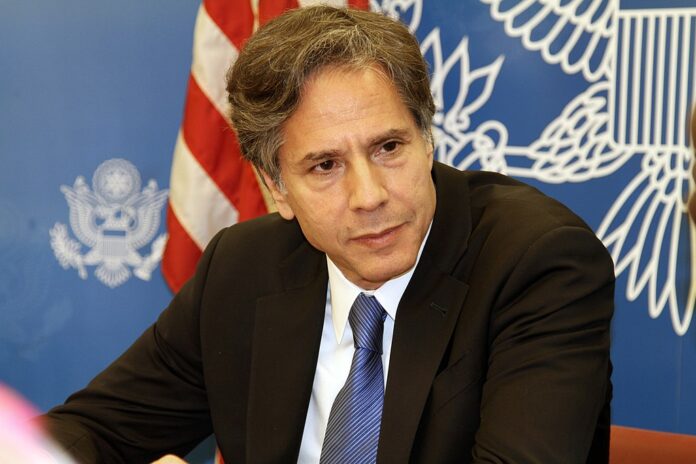President Joe Biden expresses optimism about a potential Gaza ceasefire deal, while Secretary of State Antony Blinken prepares for a Middle East diplomatic mission to advance the negotiations
On August 17, 2024, President Joe Biden announced a cautious but optimistic outlook on a potential ceasefire agreement for Gaza, highlighting that the deal is now “much, much closer” to fruition. Speaking to reporters, Biden acknowledged that while progress has been made, there are still critical issues to resolve before a final agreement can be reached.
The President’s remarks come as U.S. Secretary of State Antony Blinken is set to travel to the Middle East on Saturday to continue the diplomatic push for a ceasefire deal. This development marks a renewed effort to halt the ongoing violence between Israel and Hamas, which has resulted in significant casualties and suffering, particularly in Gaza.
Embed from Getty ImagesBiden’s statement emphasized the urgency of the situation, urging all parties involved to avoid actions that could derail the fragile negotiations. The proposed deal aims to facilitate the release of captives held by Hamas in exchange for Palestinian detainees in Israeli jails. Despite the encouraging signs, Biden stressed that “we’re not there yet,” indicating that challenges remain in finalizing the ceasefire.
Previous attempts by the Biden administration to mediate a ceasefire in Gaza had faced criticism for perceived inaction and insufficient leverage over Israel. However, the administration’s renewed efforts reflect a strategic push to bring about a resolution to the prolonged conflict.
In a separate announcement, Biden confirmed that Secretary of State Antony Blinken will lead U.S. diplomatic efforts in the region, with plans to visit key stakeholders. This move underscores the administration’s commitment to resolving the conflict and reinforces its engagement with international partners.
During a recent media briefing, Biden mentioned conversations with Qatari Emir Sheikh Tamim bin Hamad al-Thani and Egyptian President Abdel Fattah el-Sisi, both of whom have shown strong support for the U.S. mediation efforts. The ongoing negotiations, taking place in Doha, have seen a temporary pause, but they are expected to resume next week in Cairo, where the final touches on the agreement will be negotiated.
A joint statement from Qatar, Egypt, and the U.S. expressed a shared commitment to achieving a ceasefire that would alleviate the humanitarian crisis in Gaza and reduce regional tensions. The statement highlighted a “new spirit” among the participants, reflecting optimism about the potential for a successful outcome.
The diplomatic push has also been supported by senior U.S. officials, who have described the current round of talks as the most productive in recent months. Despite progress, significant hurdles remain, including disagreements over the management of the Gaza-Egypt border and the movement of Palestinians within Gaza.
The Israeli delegation, led by high-ranking officials including Mossad chief David Barnea and military negotiator Nitzan Alon, has been actively involved in the negotiations. The U.S. delegation includes CIA Director Bill Burns and Middle East envoy Brett McGurk, highlighting the high level of international involvement in the efforts.
As negotiations continue, there is a heightened sense of urgency given the broader regional implications. Iran has warned of potential retaliation against Israel following the assassination of Hamas leader Ismail Haniyeh in Tehran on July 31, adding a layer of complexity to the diplomatic landscape.
Analysis:
Political: The potential Gaza ceasefire deal represents a significant political manoeuvre by the Biden administration, aiming to resolve one of the most contentious conflicts in the Middle East. Biden’s cautious optimism and the appointment of Secretary of State Antony Blinken to lead diplomatic efforts underscore the administration’s commitment to leveraging its influence in achieving a resolution. The involvement of high-level officials from the U.S., Qatar, and Egypt highlights the international dimension of the negotiations and the complex political landscape surrounding the conflict.
Social: The ongoing violence in Gaza has had a profound impact on the civilian population, with thousands of casualties and widespread displacement. The potential ceasefire deal aims to address the immediate humanitarian crisis by facilitating the exchange of captives and improving living conditions in Gaza. Socially, the ceasefire is expected to bring relief to affected communities and reduce the level of trauma experienced by civilians. The international focus on the negotiations reflects a broader concern for humanitarian issues and the well-being of the population in conflict zones.
Racial: The Gaza conflict, with its complex history and deep-rooted grievances, involves significant racial and ethnic dimensions. The conflict impacts Palestinian communities, who face severe hardships as a result of the ongoing violence. The proposed ceasefire deal seeks to address some of these issues by facilitating humanitarian aid and reducing hostilities. The racial dynamics of the conflict are reflected in the broader discussions about the rights and treatment of Palestinians, as well as the international response to the situation.
Gender: While the Gaza ceasefire negotiations are primarily focused on political and humanitarian aspects, gender dynamics are indirectly affected. Women and children in Gaza are among the most vulnerable populations, experiencing heightened risks and challenges during the conflict. The potential ceasefire aims to alleviate some of these pressures by improving living conditions and ensuring humanitarian aid reaches those in need. The broader discussions about the conflict also include considerations of gender-specific impacts and the need to address the unique needs of women and children in conflict zones.
Economic: The ongoing conflict in Gaza has had severe economic repercussions, affecting both the local and regional economies. The proposed ceasefire deal aims to stabilize the situation and potentially restore some level of economic activity in the region. By addressing key issues such as border management and movement restrictions, the deal could facilitate the flow of goods and aid, helping to alleviate some of the economic hardships faced by Gaza’s residents. The broader economic implications of the ceasefire also include the potential for reduced regional instability and improved prospects for economic recovery.
